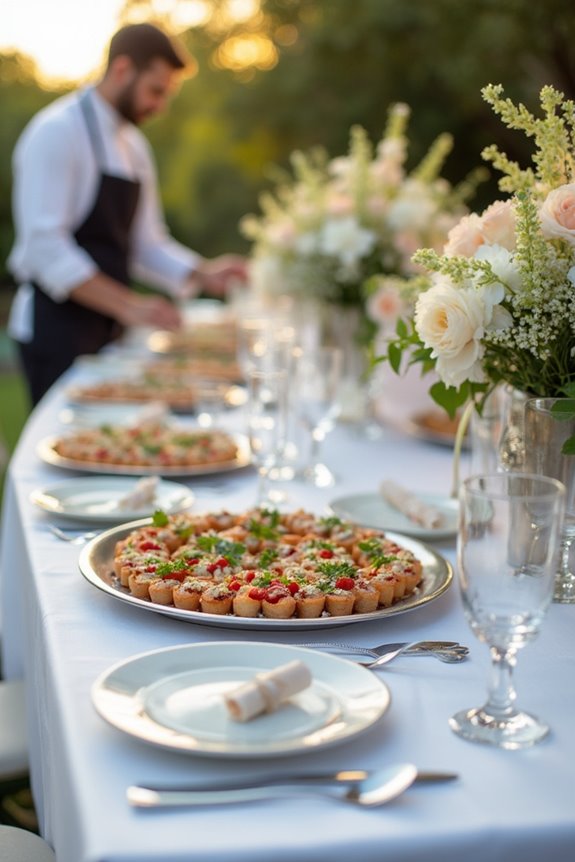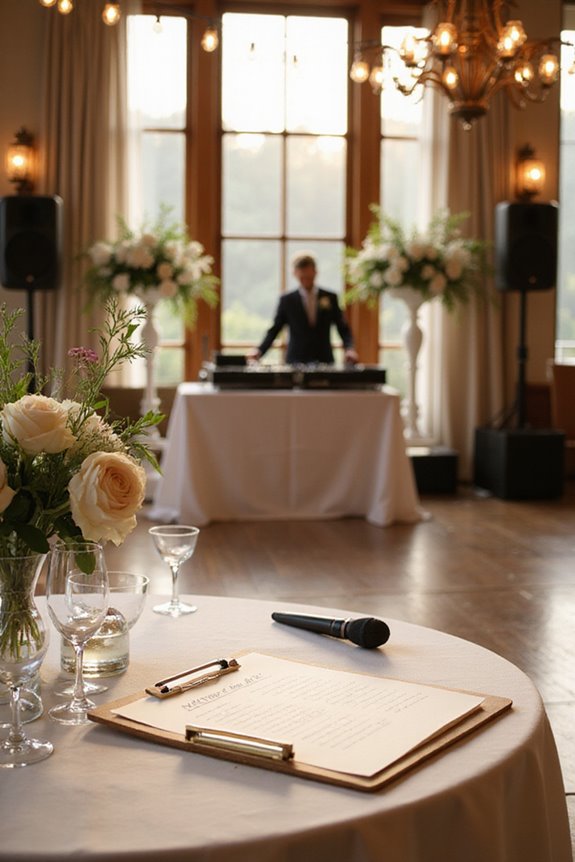Choosing a caterer for our event can feel overwhelming, but we can break it down together. First, assess our guest count and dietary needs. Prioritize food quality; consider locally sourced ingredients. Look for venues close to transport and parking. Let’s find a caterer who can customize the menu to fit everyone. Don’t forget to compare pricing and check client testimonials for satisfaction. If we keep exploring, we’ll find the perfect match for our special day!
Key Takeaways
- Estimate guest attendance based on the type of invitees to determine the right amount of food needed.
- Prioritize caterers who source local and seasonal ingredients to ensure food quality and safety.
- Assess the venue’s accessibility and amenities, as it impacts the overall guest experience.
- Confirm the caterer’s flexibility in accommodating dietary restrictions and menu customization requests.
- Compare pricing transparently among caterers, ensuring you understand all costs involved for informed decisions.
Assessing Your Event Size and Guest Count
When planning an event, how do we go about evaluating our guest count and size? First, we should consider our guest estimates. For social events, we can expect about 85% attendance from local invitees, including spouses and kids. If guests are traveling from afar, it drops to around 55%, unless they’re family, in which case we can boost that to 85%. For corporate events, we often see nearly full attendance during work hours, but it dips to 60-70% after hours. To nail down our attendance predictions, we might use formulas based on local and out-of-town guests. Keeping track with RSVPs is essential—let’s not be caught short on food! Keeping it fun guarantees everyone leaves happy.
Prioritizing Food Quality
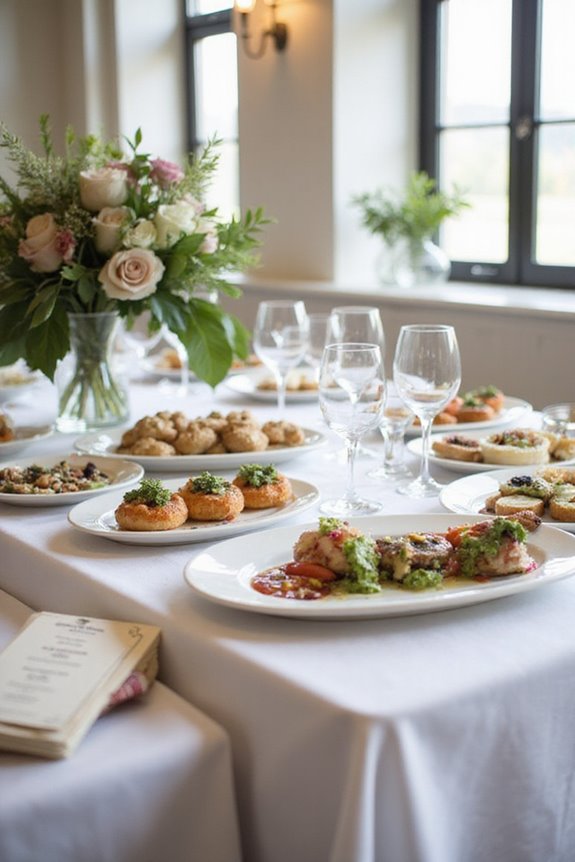
While planning our event, we can’t overlook the importance of food quality—it can make or break the experience for our guests. To guarantee we’re serving exceptional dishes, we should prioritize ingredient sourcing. Let’s ask our caterer about where they get their ingredients; locally sourced and seasonal options often taste better and are fresher.
We also need to check for food safety certifications, like ServSafe or HACCP. These certifications show that the caterer follows strict safety protocols, minimizing the risk of foodborne illnesses.
Lastly, let’s do a taste test before finalizing our choice. This way, we can enjoy some delicious samples and feel confident about our catering decision. After all, happy guests mean a successful event!
Understanding Venue and Location Considerations
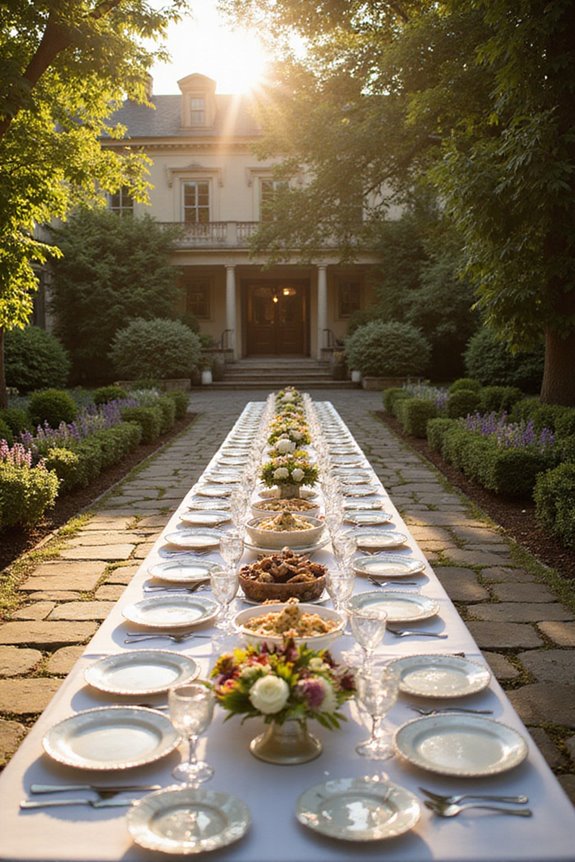
Choosing the right venue can feel like a challenging task, especially since it sets the stage for our entire event. First, let’s think about venue accessibility. We want our guests to arrive easily, so consider locations near major transportation options, like airports and train stations. This can make a huge difference for those without a car!
Next, let’s look at parking. Ample on-site parking or shuttle services can really help. Plus, we should guarantee the venue complies with ADA standards, so everyone feels welcome.
Lastly, let’s consider the neighborhood. A venue in a lively area can offer additional amenities like dining and lodging, enhancing our guests’ experience. After all, happy guests make for a successful event!
Evaluating Flexibility and Special Requirements
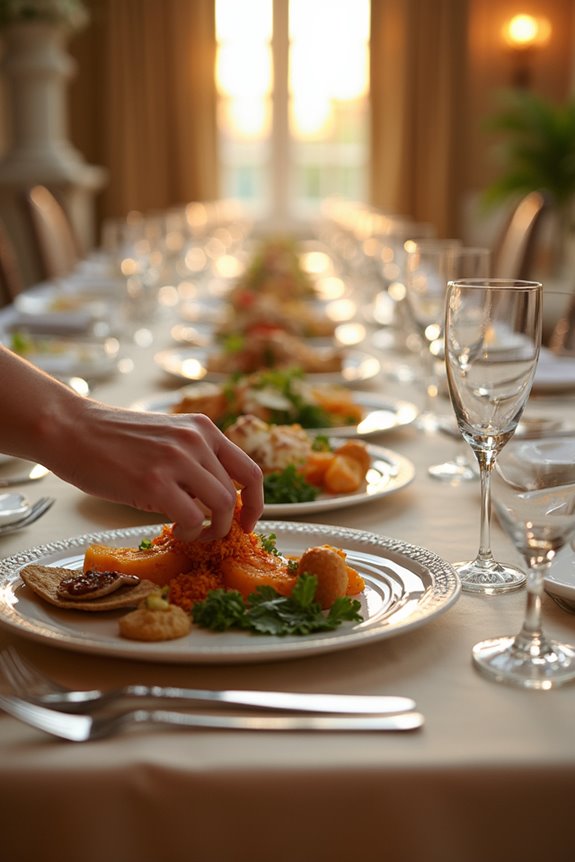
Evaluating flexibility in caterers is essential, especially if we’re aiming to create a memorable event that meets everyone’s needs. A good flexibility assessment should include their ability to handle dietary accommodations. Do they offer options for gluten-free, vegan, or allergen-sensitive guests? If so, that’s a win!
Next, we should check if they can customize menus based on our requests. Imagine needing a last-minute change—can they handle it without compromising quality?
Also, let’s ask about their staffing flexibility. Can they adjust staff based on our event size and style? This adaptability can make or break our event. So, let’s guarantee we choose a caterer who can pivot and deliver an amazing experience for all our guests!
Analyzing Pricing and Value Transparency
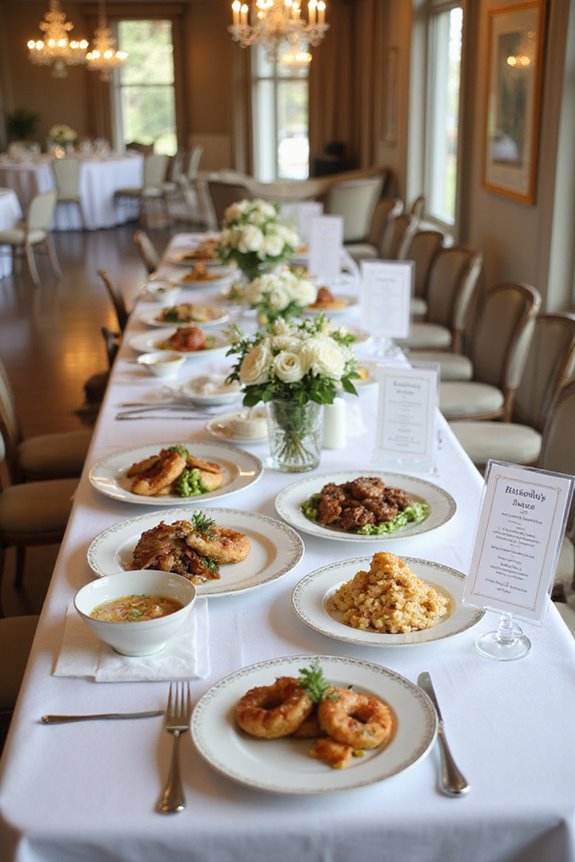
What should we keep in mind when analyzing pricing and value transparency with caterers? First, let’s look at pricing strategies. Catering costs can average around $70 per person for food, but remember, drinks add to that! Comparing prices across different caterers helps us see value comparisons, especially with package deals that might save us money.
Next, we need clear quotations. A transparent caterer will break down all costs, including those sneaky service charges and taxes. If you notice a price spike, it could be seasonal. Finally, don’t hesitate to ask questions. Open communication is key! By understanding these aspects, we can make informed decisions that fit our budgets while keeping our guests happy.
Measuring Client Satisfaction and Operational Metrics
When planning an event, it is understood that measuring client satisfaction and operational metrics is key to guaranteeing everything runs smoothly and our guests leave happy. First, let’s gather client feedback through post-event surveys. These can focus on food quality, service speed, and staff friendliness. Next, we should track essential performance metrics. For instance, monitoring our service speed can reveal if delays are impacting satisfaction. It’s also smart to analyze our food cost percentages; we want to guarantee profitability while delivering quality. Finally, integrating these insights helps us make informed decisions. By correlating satisfaction scores with operational data, we can continually improve and adapt our services. After all, a happy client is more likely to return—no pressure, right?
Reviewing Caterer Experience and Specializations
How can we guarantee we choose the right caterer for our event? First, we need to look at their experience relevance. A caterer with years in the industry knows how to handle various event types, from weddings to corporate gatherings. Their specialization depth is equally important—caterers who focus on specific events often manage logistics better and meet our expectations.
We should ask about their track record with similar events. If they’ve successfully catered large-scale parties or intimate gatherings, that’s a good sign! Also, notice their responsiveness. A caterer enthusiastic to understand our needs shows they’re committed to delivering a great experience. Remember, finding the right caterer can be an invigorating journey, not just a task. Let’s enjoy the process!
Exploring Menu Options and Customization
While planning our event, we should remember that the menu plays an essential role in making it memorable. Exploring menu options is all about catering to our guests’ tastes and dietary needs. With current menu trends, we can offer diverse cuisines, from international flavors to local specialties. Let’s not forget about dietary requirements—having vegan, gluten-free, and allergen-sensitive choices shows we care.
Customization is key. We could create a buffet with mix-and-match stations or offer signature dishes that reflect our personalities. And if we’re feeling adventurous, why not include a live cooking station? It adds flair and fun! In the end, a thoughtfully curated menu enhances our event and leaves our guests raving about the experience.
Checking References and Client Testimonials
Isn’t it nerve-wracking trying to find the perfect caterer for our event? One effective way to ease those worries is through thorough reference verification. We should contact past clients directly to get their honest opinions. Look for references from similar events to guarantee relevance.
Next, let’s immerse ourselves in testimonial analysis. When reading testimonials, we want to focus on mentions of food quality, service efficiency, and staff professionalism. Don’t shy away from asking about tastings—if many clients rave about them, that’s a good sign!
Finally, check multiple review platforms for consistent themes; recent reviews often give the best insights. By combining these strategies, we can confidently choose a caterer that meets our needs!
Frequently Asked Questions
How Far in Advance Should I Book a Caterer?
When planning our events, we should think of the booking timeline like a delicate dance. To guarantee catering availability, let’s aim to secure our caterers 5 to 12 months in advance for ideal choices.
What Questions Should I Ask During a Catering Consultation?
During our catering consultation, let’s ask about menu options and how they accommodate dietary restrictions. We should also explore customization possibilities to guarantee our guests have a delightful and inclusive dining experience at the event.
Can Caterers Provide Tables, Chairs, and Linens?
Yes, many caterers provide catering essentials like tables, chairs, and linens as part of their event rentals. This makes planning easier for us by consolidating everything into one service, ensuring a cohesive look for our event.
What Happens if My Caterer Encounters a Staffing Issue?
Imagine a ship sailing smoothly until a storm brews. If our caterer faces staffing issues, they’ll activate contingency plans and implement staffing solutions, ensuring we still enjoy a delightful event despite any challenges.
How Do I Handle Gratuity for Catering Staff?
When it comes to handling gratuity for catering staff, we should follow gratuity guidelines and understand tipping etiquette. Let’s clarify with the caterer what’s included before deciding on any additional tips for great service.

